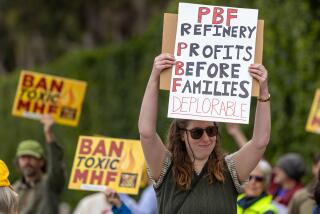West German-Owned Chemical Plant in Louisiana Called ‘Bhopal on the Bayou’
- Share via
GEISMAR, La. — The sour smell of chemicals burns the air at the giant BASF Wyandotte Corp. plant, a 2,300-acre maze of silver pipes fed by scores of black railroad cars lined up like soldiers.
The plant, on the banks of the Mississippi River between Baton Rouge and New Orleans, uses some of the most toxic chemicals in the country to make plastics, herbicides and antifreeze.
Company executives call it an efficient industrial money-maker. But labor union officers and a Michigan congressman call it something else: “Bhopal on the bayou.”
Critics say the West German-owned plant, center of a bitter two-year labor dispute, has a record of minor accidents and near-misses that reminds them of the poor safety record that preceded the chemical leak at the Union Carbide plant in India in December, 1984. More than 2,000 people died.
Since the June 15, 1984, lockout of 370 members of the Oil, Chemical and Atomic Workers union in a dispute over wages and seniority, the company has run the plant with temporary contract workers--workers who the union says are inexperienced and susceptible to pressure to cut corners and ignore safety procedures.
“It’s a ticking time bomb out there,” asserted Esnard Germillion, chairman of the union’s Local 4-620 and a 27-year veteran of the plant. “The scenario is there leading up to a catastrophe.”
The work done at the BASF plant underscores the daily danger of chemical leaks, spills or improper disposal in Louisiana, a place of high concentrations of chemical and petrochemical operations and, at least in the past, lenient state standards.
Some of the chemicals used in the plant are highly volatile, like phosgene, chlorine and isocyanate compounds similar to those that leaked at Bhopal. The volumes are staggering. Each hour, the plant uses more than 25,000 pounds of phosgene and 40,000 pounds of methylene diphenylene isocyanate, on average. Employees and visitors are required to carry respirators and other safety gear. Outside a control room, an ambulance is parked at the ready.
Union officers assert that the plant has suffered a series of accidents, including four minor fires and 12 spills in one month last year and an April 2 phosgene leak that spewed a chemical cloud over unpopulated parts of Ascension Parish. No injuries were reported from the leak.
What’s more, union leaders charge, BASF has issued misleading statements minimizing the danger and the number of accidents by reporting, for example, only mishaps involving BASF employees, not contract workers.
Michigan Democrat John Conyers Jr., chairman of the House Judiciary subcommittee on criminal justice, plans to hold hearings to investigate union charges that BASF has not fully disclosed dangers at the plant and misrepresented its safety record.
Conyers, whose state is also home to several major chemical manufacturers, has already introduced legislation that would make it a crime for any corporate executive to misrepresent or hide safety information.
“What we have seen,” Conyers’ spokesman, Julian Epstein, said, “is shoddy health and safety practices, a series of symptoms that things were wrong, and withholding, suppression and distortion of information.”
Those elements were “present at Bhopal,” Epstein said, and are the same “that we think we see at Geismar.”
“That’s crazy,” BASF plant manager Les Story retorted. “The people making those allegations don’t know what happened in Bhopal, India.”
More to Read
Sign up for Essential California
The most important California stories and recommendations in your inbox every morning.
You may occasionally receive promotional content from the Los Angeles Times.










